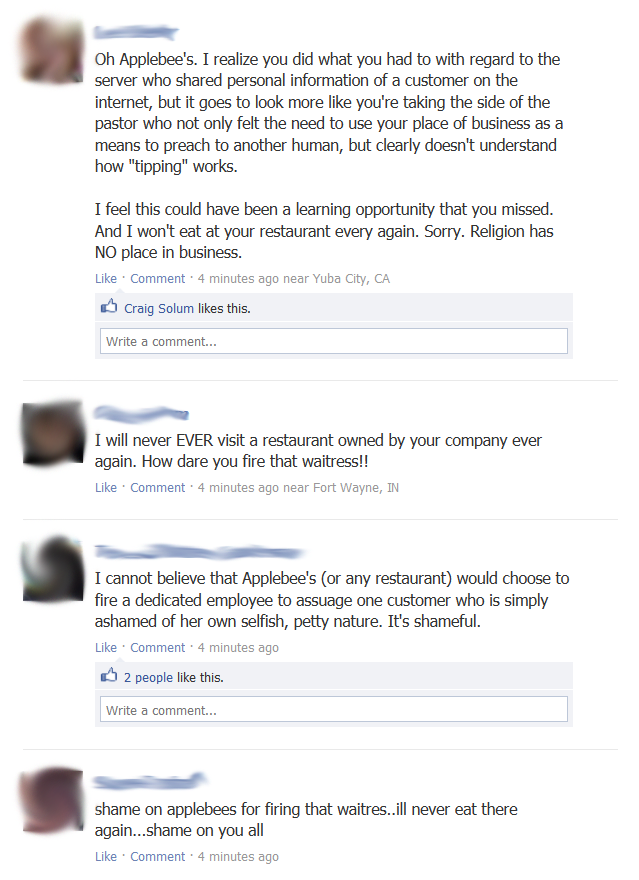Post by Ben Taylor from Eloqua.
Social media has become one of the most indispensable forms of marketing to date.
Brands are born and developed on it, personalities go from obscurity to superstardom, and great ideas are rampantly shared. There are many examples of social media successes to inspire us.

However, reputations are also damaged and horrifying gaffes are made, so let’s look at some examples of that and learn how we can avoid mistakes made by other brands.
Schadenfreude is fun.
Amy’s Baking Company
This now-famous train wreck that is Amy’s Baking Company, a restaurant in Arizona, has become a cornerstone in the horror stories marketers tell each other around the campfire.
The restaurant had already been featured on Gordon Ramsay’s Kitchen Nightmares, which isn’t a great start.
Their following endeavors on Reddit and Facebook devolved into a nightmarish display of defensiveness and then expletive-laden threats and insults.
While I thought it was awfully romantic for Samy to call his wife “a jewel in the desert,” it was lost in a sea of all-caps cursing. To top off the whole fiasco, they claimed that they had been hacked and weren’t responsible for any of their comments.
Classy.
Applebee’s Really, Really Poor Response
Not too long ago, chain restaurant Applebee’s had a similar issue to Amy’s Baking Company in that they completely fumbled their communication with consumers who took the time to write to them.
The hullaballoo started with the firing of a waitress for posting online a rude note a customer had written on a receipt. The Internet objected (for the most part) to the waitress’s termination and Applebee’s leapt into a very strange PR campaign of pissing off as many people as possible.
They ignored a lot of the comments, then they deleted some, then they copy-pasted pseudo-sympathies, then they panicked and started commiserating and arguing with individuals personally.
The debacle had over 1.4 million views and engagement on all social fronts, but primarily Facebook and Twitter. Well, at least they didn’t curse at their attackers.
Key Takeaways From Amy’s and Applebee’s
Don’t lose your cool.
Don’t lie.
Don’t accuse your commenters of lying.
If you’re getting upset by the situation, step back and STOP POSTING until you get your emotions in check.
There are literally thousands of people who will gleefully document your fails and make sure you can’t dig yourself out of your mess.
At the same time, be genuine in your responses. A little heart in your social media will not only build brand personality, but also help avoid many of the missteps that cause these problems. You have to strike the right balance between being personal and professional.
To put it succinctly: act like a human, not like a marketer (just kidding-ish).
Nike, KFC, and Kenneth Cole Desperately Need Sensitivity Training
Nike’s now-infamous St. Patrick’s day-centric launch of their “Black and Tan” shoes hit a sour note when it came to light that the phrase evokes painful national memories for the Irish people.
Maybe trying to profit from a country’s history could require a little research into that country’s history?
Kenneth Cole is no stranger to idiotic tweets. In September, they tweeted about “boots on the ground” rhetoric US politicians were using regarding the possibility of sending troops to intervene in the Syrian civil war.
“Boots on the ground” or not, let’s not forget about sandals, pumps and loafers. #Footwear
— Kenneth Cole (@KennethCole) September 5, 2013
While they maintain they’ve spun this faux pas in a positive way, it’s going to haunt them forever, especially when they next try to comment on relevant news.
The worst of the awful mistakes has to be KFC Thailand’s 2004 Boxing Day suggestion to watch the earthquake reports while eating a bucket of their chicken.
To get serious for a second, well over a quarter million people died in the earthquakes and subsequent tsunamis. There was an extraordinary amount of suffering that day.
And KFC was selling chicken.
Key Takeaway from Nike, Kenneth Cole, and KFC
It’s unfortunate that this needs to be said: DO NOT use tragedy and violence as a marketing opportunity.
Ashton Kutcher and Woody Harrelson
Ashton Kutcher’s outrage at Penn State for firing football coach Joe Paterno seemed out of line, given that the coach was being accused of sexually abusing children.
Kutcher’s Tweet
“How do you fire Jo Pa? #insult #noclass as a hawkeye fan I find it in poor taste.”
Kutcher apologized as soon as he realized the reason for the sacking, but it remains a black mark on his record.
While a little unfair to categorize him as insensitive, this goes to show that you shouldn’t fire off emotional tweets without some supporting facts.
Woody Harrelson had a different kind of misstep when he approached the link-sharing network, Reddit, for an AMA (“Ask Me Anything”) session. The idea behind an AMA is Reddit users are able to ask the poster (typically someone famous) anything about their work, their opinions, and so on.
But Harrelson clearly didn’t bother to research who he was talking to and treated the Q&A like it was a pit stop on a marketing tour. Users immediately decried his insistence on only talking about the project he wanted to promote and have ensured that he goes down as the worst AMA guest ever.
Key Takeaways from Kutcher and Harrelson
Know your audience and, above all, know what you’re talking about before you open your mouth.
It’s endearing and honest to tweet whatever off-the-cuff thoughts pop into your head, and fans dig that sometimes, but don’t comment on news developments unless you’ve done at least one iota of research.
Special Mention: #susanalbumparty
This hashtag was meant to promote singer Susan Boyle’s album release.
Please don’t make me explain why the hashtag funny.
Aside from the humor, you can imagine how many people focused on the odd hashtag rather than focusing on the fact that an album was being released.
Key Takeaway from the Bum Party
Before you send a tweet or post a status, consider showing the content to a teenager or particularly immature coworker. If they start snickering, reassess.
Wrapping Things Up
If we can learn from these lessons, many of which are painfully obvious, perhaps we can avoid embarrassing ourselves and our brands in the future.
Despite the endless hours of entertainment that such train wrecks afford everyone else, it can be really hard to dig a brand’s reputation out of such mistakes, especially for smaller companies who don’t have the brand equity of an Applebee’s or Nike.
Do yourself and everyone else a huge favor: inject some common sense and basic PR into your social media marketing. If you don’t know how to do that and you’re unwilling to pay someone who does know, you just may be better off keeping your online presence to a minimum.
_______________________________
About the Author: Ben Taylor is a pseudo-human (marketer) who specializes in writing about social media. His hobbies include reading, looking good, and hacking Alicia Keys’ Twitter account. He writes for social media strategy firm, Eloqua.



Speak Your Mind